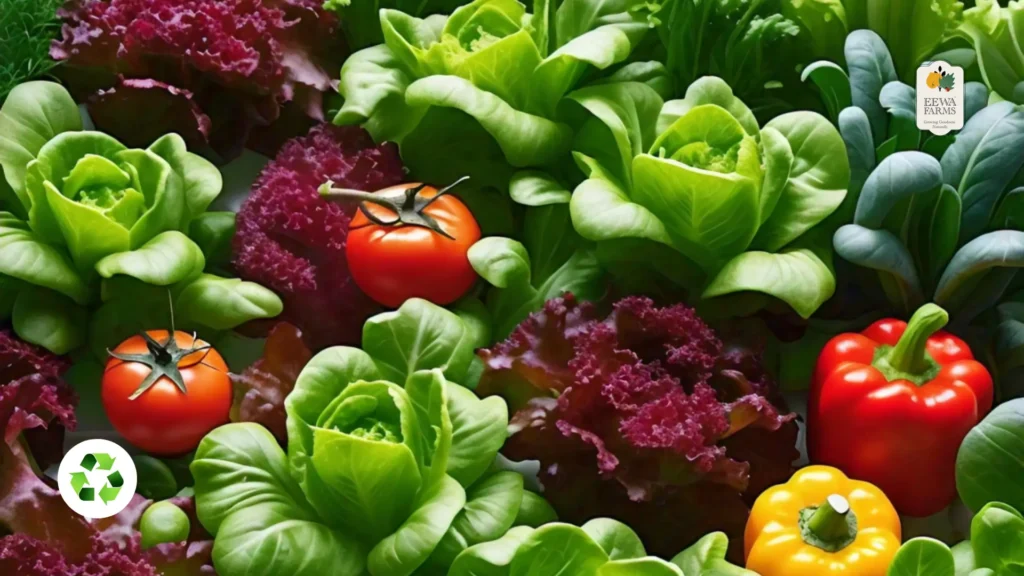Why Hydroponic Vegetables Are a Cleaner and Healthier Choice
Why Hydroponic Vegetables Are a Cleaner and Healthier Choice

Introduction
In recent years, hydroponic vegetables have become quite popular, and for good reason. This modern farming technique offers a cleaner, healthier, and more efficient way to grow fresh produce. But what exactly makes hydroponic vegetables a better choice?
The absence of soil in hydroponic systems reduces the risk of contamination from soil-borne diseases and pests, leading to cleaner produce. This method involves growing plants in a nutrient-rich water solution, where water soluble nutrients are delivered directly to the plant roots.
Let’s further dive into the benefits and see how this innovative approach to farming can enhance our daily meals, from hearty Indian curries to fresh Western salads.
Cleaner Vegetables: Less Contamination, More Safety
One of the biggest advantages of hydroponic vegetables is that they are grown in a controlled environment, free from soil. Traditional farming normally involves soil that can harbour harmful pests and diseases. These pests and diseases can sometimes make their way onto the vegetables, leading to contamination. Hydroponic farming avoids this by eliminating soil altogether. As a result, the vegetables are less likely to come into contact with harmful pathogens.
Nutritious and Delicious
Hydroponic vegetables are cleaner and they can also be more nutritious. When plants are grown hydroponically, the nutrients they need are delivered directly to their roots through the water. This means that the plants can get exactly what they need to grow healthy and strong. As a result, hydroponic vegetables can sometimes have higher levels of certain nutrients compared to their soil-grown counterparts.
Environmental Benefits
Hydroponics, a soil-free farming method, offers numerous benefits, including higher yields, reduced water usage, and fewer chemical inputs. Hydroponics can protect plants from soil-borne diseases, it also poses risks of microbial contamination. Human pathogens can spread quickly through circulating nutrient solutions, potentially affecting entire crops. By implementing measures like using clean planting materials, treating nutrient solutions, modulating microbiota, and following strict sanitation practices, hydroponic farmers can minimize the risk of microbial contamination and ensure the safety of their produce.
Another significant benefit of hydroponic farming is its water efficiency. Traditional farming methods often require large amounts of water, much of which is lost through evaporation, runoff, or inefficient irrigation practices. Hydroponic systems, on the other hand, use a closed-loop system that recycles water, reducing water usage by up to 90%. This makes hydroponic farming an ideal solution for areas where water is scarce, contributing to more sustainable food production.
Enhancing Oriental, Indian, and Western Cuisines
Hydroponic vegetables are not only healthier and cleaner, but they also bring a level of consistency and flavour that can enhance various culinary styles. Dishes like stir-fries and soups depend on the crispness and vibrant flavour of vegetables like bok choy, spinach, and herbs such as cilantro and basil. Hydroponically grown vegetables are harvested at their peak ripeness, ensuring that they retain their maximum flavour and nutritional value. The result is a more intense flavourful profile that can elevate the taste of all Oriental dishes.
Indian cuisine also relies heavily on fresh vegetables and herbs to create bold, complex flavours. Hydroponically grown herbs like cilantro, mint, and fenugreek have a more concentrated flavour, making them ideal for Indian dishes like curries, chutneys, and dals. Leafy greens such as spinach (palak) and fenugreek leaves (methi) also benefit from hydroponic farming, as they retain their nutritional value and texture, adding depth and flavour to Indian meals.
Western cuisine, particularly in salads and raw dishes, also benefits from hydroponic produce. Leafy greens like lettuce, kale, and spinach grown hydroponically have a consistent size, colour, and flavour, making them ideal for raw consumption in salads or sandwiches. The uniformity and freshness of these vegetables enhance the overall dining experience, offering a vibrant and nutrient-dense option for health-conscious consumers.
Addressing Agricultural Challenges
Over-farming and the excessive use of chemical fertilisers in traditional agriculture have led to soil degradation in many parts of the world. This results in reduced soil fertility, lower crop yields, and increased reliance on chemical inputs to maintain productivity. Hydroponics eliminates the need for soil, offering a sustainable solution that reduces pressure on arable land and allows for continuous food production without damaging the environment.
Water scarcity is another major concern in global agriculture. Traditional farming methods consume vast amounts of freshwater, contributing to water shortages in many regions. Hydroponic systems use significantly less water than conventional farming, addressing this issue by recycling water and minimising waste. This resource efficiency makes hydroponic farming a viable solution for sustainable agriculture, particularly in regions facing water scarcity.
Year-Round Production and Urban Agriculture
One of the most significant advantages of hydroponic farming is its ability to produce vegetables year-round, regardless of external weather conditions. Traditional farming methods are often limited by factors such as climate, soil quality, and seasonal variations, which can impact crop availability. Hydroponic systems, particularly when used in conjunction with controlled environment agriculture (CEA) technologies such as greenhouses or vertical farming setups, allow for the consistent production of vegetables throughout the year.
This capability is especially valuable in urban settings, where access to fresh, locally grown vegetables can be limited. By implementing hydroponic systems in urban areas, local food production can be expanded, reducing the need for long-distance transportation of produce. This not only ensures fresher vegetables for urban consumers but also helps reduce the carbon footprint associated with food transportation.
Culinary Flexibility and Adaptability
Hydroponic vegetables are versatile and can adapt to various cooking styles across different cultures. In Oriental cuisine, hydroponic vegetables bring a fresh, crisp texture to stir-fries, soups, and salads. The consistency and flavour of hydroponic greens make them a preferred choice for chefs seeking to create vibrant, flavorful dishes.
In Indian cooking, herbs like mint, coriander, and fenugreek are essential for creating the complex flavours of traditional dishes. Hydroponic herbs retain their potency and freshness longer, making them ideal for chutneys, curries, and spice blends. Indian households, which emphasise the use of fresh, organic ingredients, can benefit greatly from the availability of locally grown, pesticide-free hydroponic produce.
Western cuisine, with its focus on salads and fresh vegetables, is also enhanced by hydroponic farming. Hydroponic lettuces, spinach, celery, basil, swiss chard, and kale etc. have a crisp texture and uniform size, making them ideal for salads, sandwiches, and wraps. In addition, hydroponically grown tomatoes, cucumbers, and peppers maintain their flavour and juiciness, providing superior quality for Western dishes.
Citations:
- Shlomo Sela Saldinger, Victor Rodov, ORCID, David Kenigsbuch, and Asher Bar-Tal (2023). Hydroponic Agriculture and Microbial Safety of Vegetables: Promises, Challenges, and Solutions.
- Ganapathy Rajaseger, Kit Lun Chan, Kay Yee Tan, Shan Ramasamy, Mar Cho Khin, Anburaj Amaladoss, and Patel Kadamb Haribhai (2023). Hydroponics: Current trends in sustainable crop production.

